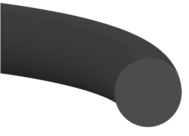FFKM and Viton are both high-performance elastomers, and they each have unique performance advantages for different application scenarios. The following is a comparative description between them.
High temperature resistance: FFKM is more resistant to high temperature than Viton. Under high temperature conditions, FFKM is able to maintain the elastic characteristics of rubber, while the deformation rate of Viton rubber increases sharply with time. FFKM Perfluoroether rubber can still maintain the elastic characteristics of rubber at a high temperature of 330°C, while the deformation rate of Viton rises sharply with time under 240°C conditions.
Chemical resistance: FFKM excels in chemical resistance and has excellent resistance to almost all chemicals. It is resistant to attack by up to 1600 chemicals, and after 6 months of immersion in a mixture of toluene, acetone and methylene chloride, FFKM rubber O-rings show almost no volume change, while other Rubber has been seriously deformed.
In contrast, Viton although also chemically stable, may not be as durable as FFKM in some extreme chemical environments.
Applications: Both FFKM and Viton are widely used in applications requiring high performance seals and corrosion resistance, such as the aerospace, aviation, chemical, petroleum, and nuclear energy industrial sectors. FFKM rubber is especially suitable for high temperature, high pressure and strong corrosive working environment due to its excellent high temperature and chemical resistance. Viton on the other hand, is also widely used in automotive, petrochemical and other fields due to its good oil resistance and certain high temperature resistance.
Cost and Availability: FFKM rubber is usually more expensive and relatively costly to make, but its long life and excellent performance can significantly reduce maintenance costs and downtime, thus improving production efficiency. In contrast, Viton may be more cost-effective in some applications due to their wider availability and relatively lower cost

